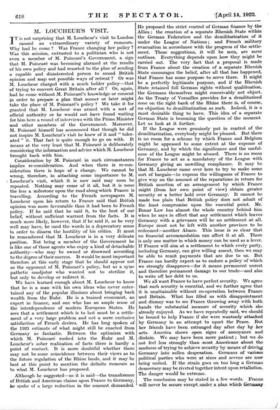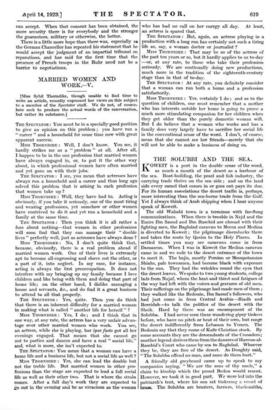M. LOITCHEUR'S VISIT.
TT is not surprising that M. Loucheur's visit to London caused an extraordinary variety of rumours. Why had he come ? Was France changing her policy ? Was this mission, entrusted to a politician who is not even a member of M. Poincare's Government, a sign that M. Poineare was becoming alarmed at the results of his own policy and had resorted to the plan of sending a capable and disinterested person to sound British opinion and map out possible ways of retreat ? Or was M. Louchetur charged with a much bolder policy—that of trying to convert Great Britain after all ? Or, again, had he come without M. Poincare's knowledge or consent in order to prepare a plan that sooner or later might take the place of M. Poincare's policy ? We take it for granted that M. Loucheur was armed with a sort of official authority or he would not have found waiting for him here a round of interviews with the Prime Minister and other members of the Government. Moreover, M. Poincare himself has -announced that though he did not inspire M. Loticheur7s visit he knew of it and " toler- ated " it. That fact is quite enough to go on with. It means at the very least that M. Poincare is deliberately considering the information and advice which M. Loucheur brought back with him.
Consideration by M. Poincare in such circumstances implies re-consideration. And when there is re-con- sideration there 'is hope of a change. We cannot be wrong, therefore, in attaching some importance to M. - Loucheur's visit, which it is now said may soon be repeated. Nothing may come of it all, but it is none the less a milestone upon the road along which France is travelling. According to the French newspapers M. Loucheur upon his return to France said that British opinion was more favourable than it had been to French policy. If he said that he said it, to the best of our belief, without sufficient warrant from the facts. It is much more likely, however, that if he said it, as he very well may have, he used the words in a deprecatory sense in order to disarm the hostility of his critics. It must be remembered that M. Loucheur is in a very delicate position. Not being a member of the Government he is like one of those agents who enjoy a kind of detachable authority—who may be owned or disowned according to the degree of their success. It would be most important therefore at this early stage that he should appear not as the opponent of M. P.oincare's policy, but as a sym- pathetic coadjutor who wanted not to sterilize it, but only to develop or redirect it.
We have learned enough about M. Loucheur to know that he is a man with his own ideas who never enter- tained any of the popular illusions about bringing back wealth from the Ruhr. He is a trained economist, an expert in finance, and one who has an ample sense of the interdependence of modern European States. He sees that a settlement which is to last must be a settle- ment .of a very large problem and not a mere exclusive satisfaction of French desires. He has long spoken of the 1921 estimate -of what might still be exacted from Germany as fantastic. Between the optimism with which M. Poincare rushed into the Ruhr and M. Loucheur's .sober realization of facts there is hardly a point of contact. It is more doubtful whether there may not be some coincidence between their views as to the future regulation of the Rhine lands, and it may be best at this point to mention the definite rumours as to what M. Loucheur has proposed.
Although he suggested—so it is said—the transference of British and American claims upon France to Germany, be spoke of a large reduction in the amount demanded. He proposed the strict control of German finance by the Allies ; the creation of a separate Rhenish State within the German Federation and the demilitarization of it under the League of Nations ; and French military evacuation in accordance with the progress of the settle- ment. These suggestions, it will be seen, are mere outlines. Everything depends upon how they might be carried out. The very fact that a proposal is made from France about the creation of a separate Rhenish State encourages the belief, after all that has happened, that France has some purpose to serve there. It might be a perfectly legitimate purpose, and if the Rhenish State retained full German rights without qualification, the Germans themselves might conceivably not object, As the Treaty of Versailles provides for a demilitarized zone on the, right bank of the Rhine there is, of course, no objection to demilitarization as such. Indeed, it is a most desirable thing to have. This idea of a separate German State is becoming the question of the moment Let us look at it further.
If the League were genuinely put in control of the demilitarization, everybody might be pleased. But there is no room for a scheme by which France and Belgium might be appeased to some extent at the expense of Germany, and by which the significance and the useful- ness of the League might be abused. There is no room for France to act as a mandatory of the League with Germany giving an unwilling compliance. It may be that M. Loucheur came over here to try to make some sort of bargain—to express the willingness of France to give way on the amount of the reparations ,in return for British sanction of an arrangement by which France might (from her own point of view) -obtain greater security or a better hold over Germany. It cannot be made too plain that British policy does not admit of the least compromise upon the essential point. Mr. Bonar Law has almost the whole country behind him when he says in effect that any settlement which leaves Germany with a grievance will be no settlement at all. Europe must not be left with another ,province to be redeemed—another Alsace. This issue .is so clear that no financial accommodation can affect it at all. There is only one matter in which money can be used as a lever. If France will aim at a settlement to which eveiy party, including Germany, can give willing assent, then we may be able to remit payments that are due to us. But France can hardly expect us to endure a policy of which we strongly disapprove—for it means permanent unrest and therefore permanent damage to our, trade—and also to write off her debt to us.
We all want France to have perfect security. We agree that such security is essential, and we further agree that it is unattainable without co-operation between France and Britain. What has filled us with disappointment and dismay was to see France throwing away with both hands the substantial measure of security which she already enjoyed. As we have repeatedly said, we should be bound to help France if she were wantonly .attacked by Germany in an attempt to upset the Peace. But her friends have been estranged day after day by 'her acts. America shows open signs of annoyance and disdain. We may have been more patient ; but we do not feel less strongly than most Americans about the madness of trying to achieve security by means of driving Germany into sullen desperation. Germans of v,arious political parties who were at sixes and sevens are now being united. If the strain goes on too long a German democracy may be riveted together intent upon retaliation. The danger would be extreme.
The conclusion may be stated in a few words. France will never be secure except,under a plan whir. can accept. When that consent has been obtained, the more security- there- is for everybody and the stronger the guarantees, military or otherwise; the better.
There is a little more hope than there was, especially as, the German Chancellor has repeated his statementthat he would accept the- judgment of an impartial tribunal on. Teparations, and has said for the first• time that the presence of French troops in the Ruhr need- not be a barrier to negotiations.











































 Previous page
Previous page